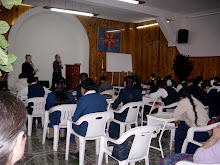
Blogging From Our Home on Oxford Hill
Though our three month Bible Study ended on Thursday night of the 20, I as blogmaster will continue to post Bible material on various subjects. Please continue to visit our blog site for future topic and discussion. Myron Hostetter
These three months have been ones of searching the scriptures; learning, applying and good spiritual fellowship. This makes our eighth year and if God gives us life, we hope to continue next January. We were blessed as various people took the responsibility to lead the Biblically based topical discussions. Now it becomes our responsibility to practice what we learned. By God's grace we will be better citizens of God's Kingdom.
Intercessory Prayer
The first 20 minutes of the Bible Study on 3-20 were about Intercessory Prayer.
Praying as a Friend of God 2 Chronicles ; Isaiah 41:8; James 2:23
• Anyone with an intimate relationship with God can be an effective intercessor.
• Holiness gives us confidence in our prayer life.
• A friend of God can ask God for anything because they understand what pleases God.
• “If we ask anything according o His will ….”
• An unsaved person cannot be an effective intercessor
This part of the evening was moderated y Norma Link from material taken from the
Book by Dutch Sheets titled, Intercessory Prayer
For the remainder of the evening Ric Fogie moderated a discussion on
The Character of God
No matter what extreme action is taken against God and his Word, the Word of God remains true and nothing can thwart its purposes.
Study taken from the web site www.siscom.net/~direct/god’s_character.htm
“All About” God’s Character – Bible Basics Series
This evening concluded our three-month, annual Bible Group study.
On Thursday, March 27 the group will meet at 6:30pm at the Ichiban Restaurant for a meal.



